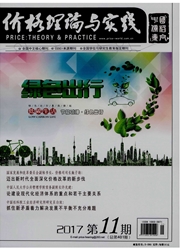

 中文摘要:
中文摘要:
怀旧旅游作为一种享乐型的情绪消费,其消费意向与价格敏感度密不可分。在消费者价格敏感度视角下探讨怀旧情绪对怀旧旅游意向之间的影响作用,有助于挖掘怀旧旅游业发展之奥妙。文章首先回顾了相关理论,在此基础上提出研究模型和研究假设,最后运用结构方程模型的方法进行验证。研究表明消费者怀旧情绪正向影响其怀旧旅游意向;消费者怀旧情绪负向影响价格敏感度;价格敏感度在消费者怀旧情绪与怀旧旅游意向之间起部分中介作用。因此,企业应重视情绪对消费者产生的作用,善于利用消费情绪以提升企业利润;瞄准和细化特定情绪的人群,对目标市场进行划分;通过把握与运用某种情绪,以达到降低消费者价格敏感度的目的。
 英文摘要:
英文摘要:
Nostalgic tourism, a hedonistic emotional consumption, is increasingly popular nowadays. The intention of nostalgic tourism and price sensitivity are inseparable. This paper explores the effect of nostalgia on nostalgic tourism intention in the perspective of consumer price sensitivity, which helps to explore the mystery of nostalgic tourism development. In this paper, the relevant theories are reviewed, and the research model and research hypothesis are put forward. Finally, the structural equation model is used to verify the model. The results show that nostalgia positively affects the nostalgic travel intention of consumers. The nostalgia of consumers negatively affects the price sensitivity. The price sensitivity plays a part of intermediary role between nostalgia and nostalgic tourism intention. Therefore, enterprises should pay attention to the role of emotions on consumers, make a good use of consumer sentiment "that enhances corporate profits, and take advantage of the certain emotions in order to lower consumer price sensitivity.
 同期刊论文项目
同期刊论文项目
 同项目期刊论文
同项目期刊论文
 期刊信息
期刊信息
